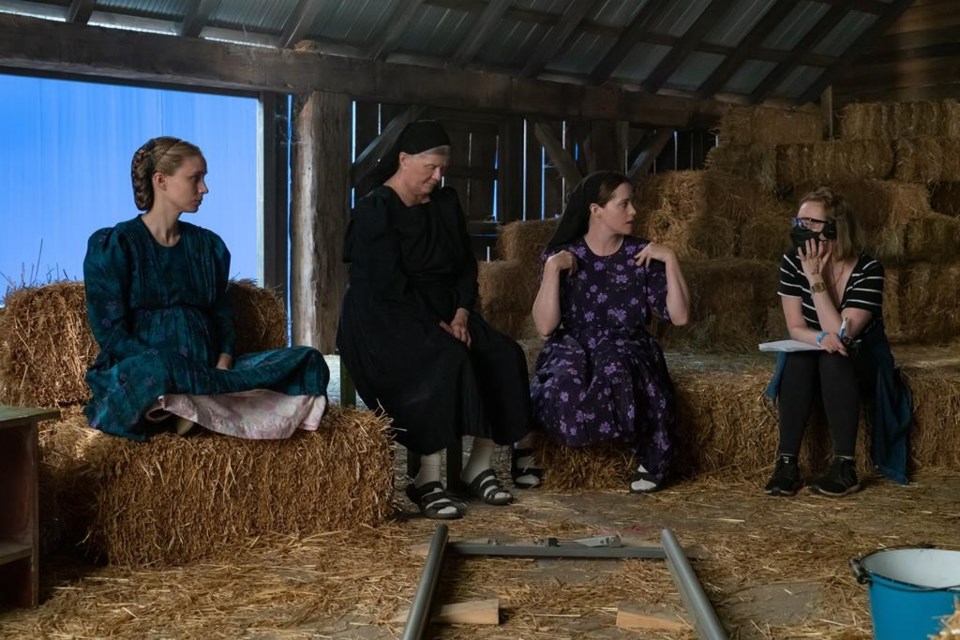TORONTO — The cinematic canon is replete with stories of great men doing important things, says Canadian director Sarah Polley — from the president faced with tough choices in a time of crisis, to the football team that takes to the field in spite of odds stacked against them.
This grandiloquent style of moviemaking strikes Polley as a little silly, dialing up the drama to make it seem like the fate of the world turns on the decision of a man in a suit or the outcome of a sports game.
In her first feature in more than a decade, Polley set out to transpose this lofty cinematic tradition onto a subject that is scarcely given space on the big screen: "Women Talking."
"In this film, I felt like, why not (have) a conversation amongst women ... feel seismic, and as though it's the only thing that matters," Polley said in an interview at the Toronto International Film Festival.
"These women are literally talking about breaking and then remaking our world. So how is that not worthy of the treatment of an epic?"
Adapted from Manitoba author Miriam Toews' 2018 novel of the same name, "Women Talking" centres on a remote Mennonite colony coming to grips with the revelation that several of the community's men are responsible for a series of sexual assaults that some had dismissed as flights of "female imagination."
When the men go into town to post bail for the attackers, the women in the colony are left to figure out how to secure their safety. A small group of delegates — played by an ensemble cast featuring Rooney Mara, Claire Foy, Judith Ivey, Jessie Buckley and Frances McDormand — convene in a hayloft to consider their options: forgive the men and maintain the status quo, stay and fight, or pack up and leave?
What ensues is a fractious debate about faith, forgiveness and justice that echoes the raging real-world discourse about violence against women and abuses of power, said Polley.
To telegraph these stakes, Polley said she drew from classical film techniques — shooting with vintage-style camera lenses and an extra wide aspect ratio — to make a conversation among women seem as intense and consequential as a showdown in an old western.
But unlike the male-coded movie pyrotechnics of yore (and now), Polley said she made a point not to treat violence as an onscreen spectacle.
The sexual assaults are never shown in the film. Instead, Polley trains her lens on the women dealing with the immediate aftermath and lingering trauma.
"It was always important for me to not focus on the acts of violence themselves, but on the impact that those acts of violence had on the women."
While blockbusters would have you believe that our destinies are decided by city-razing battles, as Polley sees it, real change arises from a less cataclysmic, but more complex kind of conflict: tough conversations.
Those can't happen when marginalized voices are suppressed by power imbalances so extreme that people are forced into "fight mode," Polley acknowledges.
It's also hard to cut through the noise of social media, she adds, which algorithmically corrals like-minded users in echo chambers that insulate them from diverging points of view.
"Women Talking" serves as an allegory for how a nuanced, open-ended exchange can catalyze the collective action needed to confront the crises of our current moment, Polley said.
When the women enter the hayloft, many of them vehemently disagree not only on what course of action they should take, but the fundamental beliefs that should guide their decision, she said.
It's only through talking, and crucially, listening, said Polley, that they can reconcile their differences and decide what to do.
"They can't move forward until they all move forward together," Polley said.
"A hierarchical patriarchal society works for no one. What I want to see now is just a conversation about what it is that we would collectively like to see built."
"Women Talking" opens in Toronto at the TIFF Bell Lightbox on Friday, expanding to additional locations and markets in January.
This report by The Canadian Press was first published Dec. 20, 2022.
Adina Bresge, The Canadian Press


